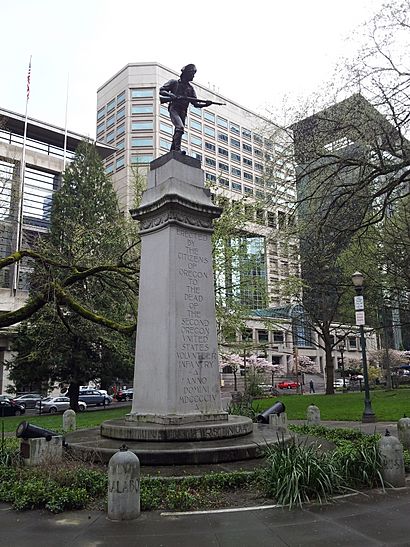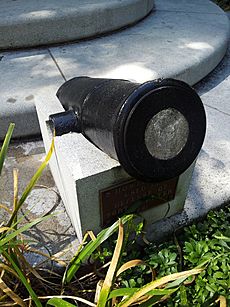Spanish–American War Soldier's Monument facts for kids
Quick facts for kids Spanish American War Soldier’s Monument |
|
|---|---|

The monument in 2015
|
|
| Artist | Douglas Tilden |
| Year | 1906 |
| Type | Sculpture |
| Medium | Bronze |
| Location | Portland, Oregon, United States |
| 45°30′58″N 122°40′38″W / 45.516088°N 122.677318°W | |
The Spanish–American War Soldier's Monument is a special outdoor statue. It is also called the Spanish–American War Memorial. This monument honors soldiers from the 2nd Oregon Volunteer Infantry Regiment. These brave soldiers fought in the Spanish–American War and the Philippine–American War. They helped free places like the Philippines, Cuba, Puerto Rico, and Guam from Spanish rule. The monument was made by an American artist named Douglas Tilden. You can find it in Lownsdale Square in downtown Portland, Oregon.
About the Monument
This monument is a sculpture that helps us remember important events. It honors the soldiers who served in the Spanish-American War. The war happened a long time ago, around 1898.
What It Looks Like

The monument has a bronze statue on top. This statue stands on a marble base. The very bottom part is made of granite. There are also two old cannons next to it. These cannons are called Howitzers. They were found buried in sand in South Carolina. A person named Henry Dosch brought them to Portland in 1902. There is also a bronze sign. It says the cannons were used to defend Fort Sumpter in 1861.
How It Was Built
People started planning this monument in 1899. They wanted to honor the soldiers who died. They sold books to raise money for the project. The committee chose a design with a bronze statue. It would stand on a marble base. They also wanted the main stone parts to be one solid piece of granite.
A company from Vermont got the job to supply the stone. The stone was cut in Vermont. Then it was shipped all the way to Portland. The stone part weighed about 64,000 pounds. When the statue was added, the whole monument was about 30 feet tall. In 2020, some paint was sprayed on the monument. But the paint was cleaned off later.
 | Misty Copeland |
 | Raven Wilkinson |
 | Debra Austin |
 | Aesha Ash |

